How To Write a Sales Resume That Stands Out [+ 5 Examples]

In this article
One would think that a resume would be easy for a salesperson to write. Because if you’re in the business of selling things, then it should be easy to sell yourself, right?
That’s not always the case. Whereas salespeople often have multiple chances of converting a prospective customer into a paying one, you really only have one shot with your resume. And figuring out what to include can feel overwhelming, especially if you have a non-linear career path or have made a career pivot, as many salespeople have.
Nervous? You aren’t alone. That’s why we’ve written this guide. Below, we’ll provide you with all the tips (and some exemplary examples) that you need to craft the perfect sales resume and stand out from the crowd.
How Important Is a Resume When It Comes to Sales?
Your sales resume is vital on two levels. It helps communicate your professional experience and background and acts as a test run for your persuasion and sales skills. For a sales professional, selling their own experience, expertise, and value is the most significant sale they may ever make.
What Should Your Sales Resume Cover?
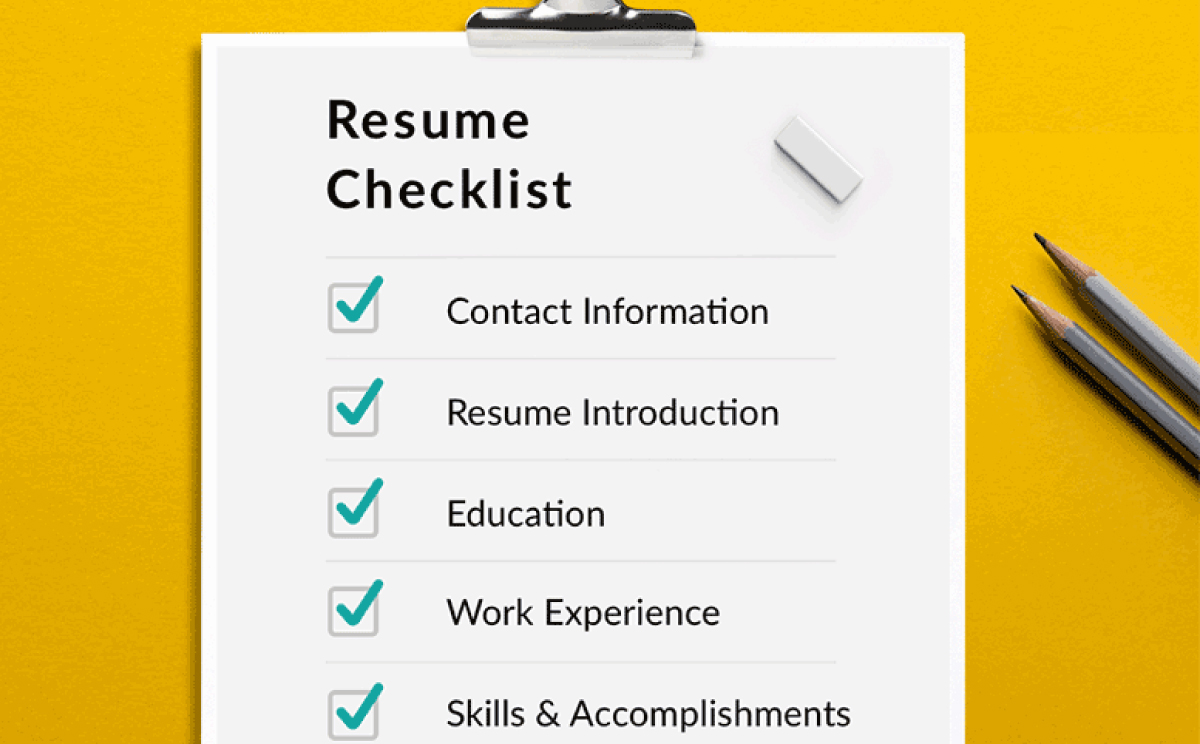
Use this checklist to ensure you don’t miss out on any essential elements:
Name, Role, and Contact Details
Be diligent here. Any spelling errors, especially in the contact details, can lead to unnecessary back and forth or rejection.
What Should You Include?
Mention your full name, title, phone number, and email address. Avoid nicknames or abbreviations of your name.
Avoid mentioning your location if the company you’re applying to is in a different region. The recruiter may have location screeners which will automatically reject applicants from other states, so consider whether mentioning your location is essential.
Tips To Ace This Section
- Spell check! Typos in contact information can be an obstacle to callbacks.
- Make sure all the details are formatted correctly when you convert it into the format you will send it out in. For example, if you are making your sales resume on Google Docs, converting it to word or PDF may change the placement of your name and contact details.
- Ensure that the email ID you mention sounds professional. You can add your LinkedIn profile, too, if it’s up-to-date.
Example

Objective/Summary/Profile
Through your summary, you are laying down how you want the hiring manager to perceive you as a professional. It signifies what’s to come in the rest of your sales resume. You can also use this as the space to clarify career transitions. Changing your career to sales can seem daunting to point out, but positioning is the crux of this section.
What Should You Include?
Resume objectives should be the last element of sales resumes that you should frame. Based on all the other sections, cull out a short statement highlighting your technical skills and goals. The summary should not exceed 50 words.
Tips To Ace This Section
- Mention the name of the company you are applying to. This will show a degree of personalization.
- Include action verbs and some data that helps highlight key responsibilities you have undertaken in the past.
- Also, consider if the company you are applying to appreciates career objectives in resumes in the first place. Recruiters are often divided on the topic, so it’s better to check whether including this section will be held against you.
Example
- Entry-level Sales Engineer with industry knowledge in biomedical equipment seeking a role with XYZ Company;
- Entry-level Sales Representative with a 2-year record of beating annual sales targets and curating successful sales strategies seeking to raise XYZ’s sales revenue
Professional Experience
There are a few ways to do this. The most common is to lay out your professional sales experience in reverse-chronological order. Or, if you want to batch your experiences (managerial experience, client-facing experience, etc.), you can do that too. And if you’re, you are applying to an entry-level sales job with minimal work experience, focus on the soft skills you have gathered, like time management and other organizational skills, and verbal communication skills.
What Should You Include?
Include responsibilities and achievements directly related to the job you are applying to. If you have experience in unrelated jobs, assess whether you should include them in your sales resume. Entry-level candidates with no professional sales experience can frame their extra-curricular activities in a way that brings out relevant soft skills.
Highlight technical skills instrumental for sales if you have no professional sales experience relevant to the role.
Tips To Ace This Section
Follow the same format for each role you list down. This could be:
- Job Title: Check the official title for your job or the industry equivalent term for it. Don’t use “Sales ninja” or “lead generation wizard” or other more casual designations.
- The official name of the company.
- Period of employment: Include the month and year.
- 3-4 bullet points mentioning your responsibilities and achievements: Start with an action verb. Focus on the impact and results rather than the mechanics of your common responsibilities.
Example
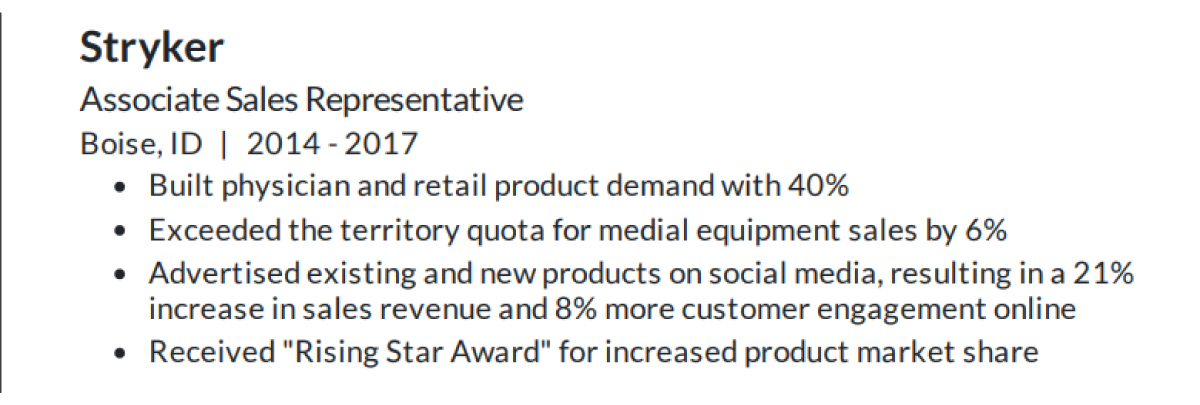
Skills
This is where you ramp up on the skills-related keywords. Look up the relevant skills for the sales position you are applying to. These could be sales planning, client relations, prospecting, product knowledge, or other niche skills.
What Should You Include?
If you have high proficiency with specific sales-related tools, mention that. Companies are always on the lookout for platform experts. Don’t include generic skills like “leadership” unless you can back it up with an award or any recognition you received.
Tips To Ace This Section
- While you don’t have to separately list soft and hard skills, mention one set first, followed by the next.
- Once you are done listing all the skills, whittle away the skills that are a given or irrelevant.
- The goal is to list 4-5 niche skills for which you can demonstrate experience through examples. Prepare stories to evince each of them.
Example
A set of skills could include:
- Customer Relationship Management or CRM (Salesforce)
- Lead management
- Cold-calls
- Product demonstrations
- Tableau
- Trend forecasting
Educational Qualifications
This section is a snippet of your educational background and accomplishments. The layout of this section will depend on how long it has been since you graduated. If you are a sales professional with more than a couple of years of work experience, your educational qualifications should not dominate your sales resume.
What Should You Include?
Include any degrees you have completed or have started on. You can get a sales job without a degree, so don’t sweat it if you didn’t finish your degree, or haven’t finished it yet.
Tips To Ace This Section
- Ensure that you meet the degree requirements mentioned in the job description.
- Follow the same format for each educational qualification you list. If you have to include an unfinished degree, mention how many credits you fulfilled.
- If you have university-level qualifications, skip diving too much into your high school qualifications.
- When you are in the middle of a degree, mention the expected graduation year.
- If you have done the GED or attended a trade school after high school, including their names with the year of graduation.
- You can also highlight any semester exchanges you did, with a highlight on the coursework you took on.
- Consider adding sales bootcamps or certificates if you don’t have a relevant degree.
Example

Certifications, Licenses, Awards, and Recognitions
You can add certifications, licenses, and awards to your resume as long as they are relevant and recent (in the past 3-4 years).
What Should You Include?
These could be scholarships, academic awards, or best performance awards during a course or job role. You can either list them in a separate section or under the relevant organization that provided you with that award or recognition.
Tips To Ace This Section
- Include all relevant sales certifications, along with their validity period.
- For certifications and licenses, follow this format: [Name of certification], [Name of Institute offering it], [Year completed].
- For awards and recognitions, if you are listing them as a separate section, following this format: [Name of Award], [Year you received it] for [Your contribution/impact]
Example

5 Awesome Sales Resumes (and What Makes Them Work)
Here, are five excellent resumes to inspire you:
Example 1

What Makes This Resume Good?
This section does a great job of evincing the quantifiable impact that the candidate had. Mentioning the increase in revenue and decrease in return rate are great ways of communicating your effectiveness.
Example 2
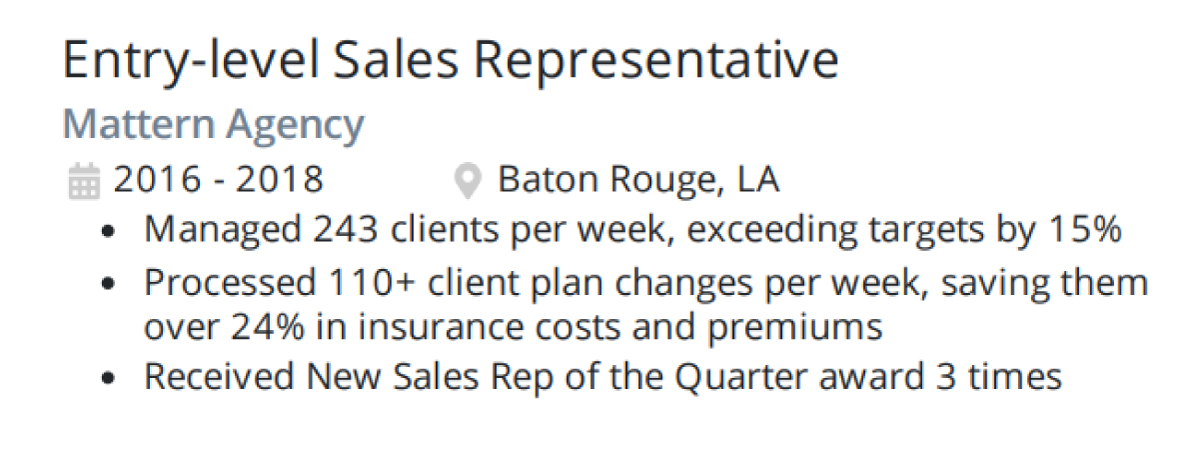
What Makes This Resume Good?
This section of the candidate’s work experience is short and specific. The candidate succinctly explains their responsibilities on a weekly basis and the results they bring to the company.
Example 3
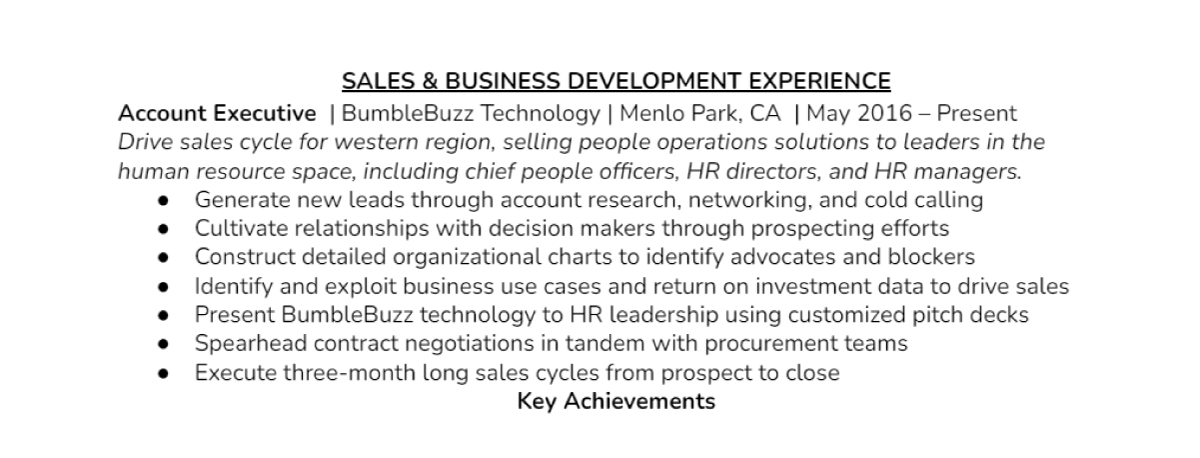
What Makes This Resume Good?
Notice how the candidate starts every bullet point with strong action verbs, which makes for more dynamic sentences.
Example 4

What Makes This Resume Good?
This objective/summary is packed with information. Note the title, years of experience, and areas of expertise (note how specific the candidate is in identifying what they are good at). This summary makes for an informative first impression.
Example 5
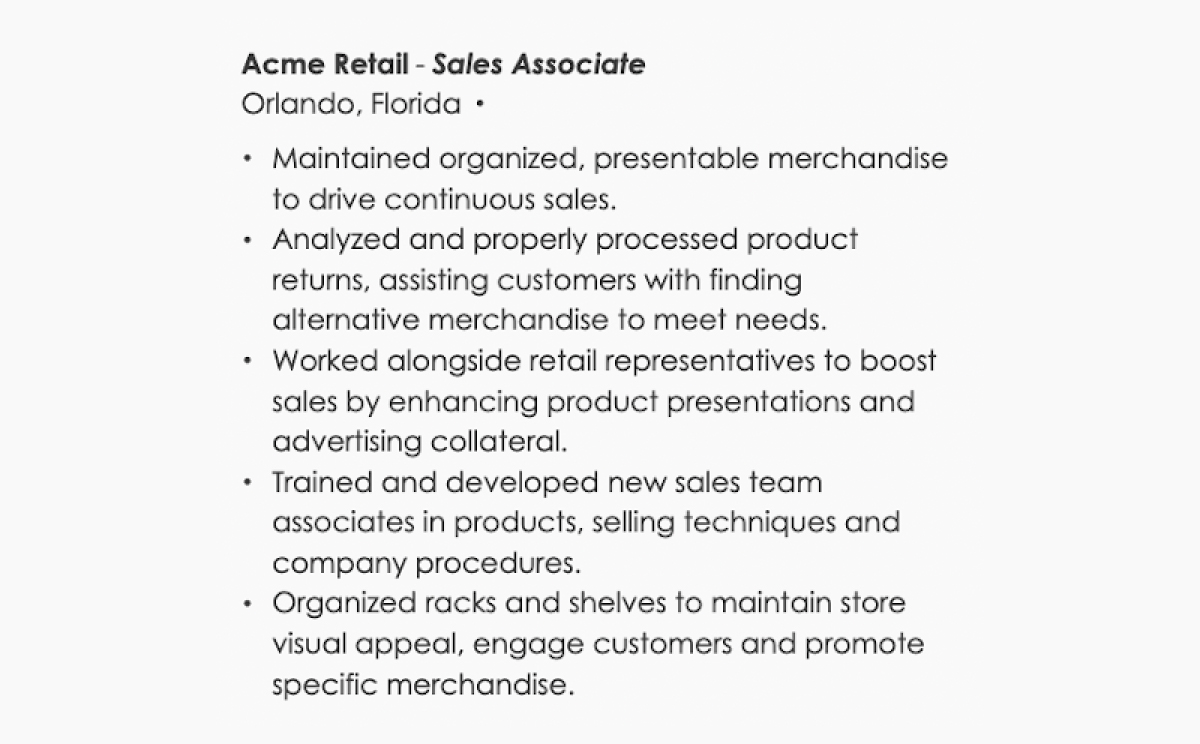
What Makes This Resume Good?
This sales resume seems to have captured numerous keywords that may be relevant to the job role. Product returns, alternative merchandise, sales representatives, product presentations, advertising collateral, sales team associates, and selling techniques are all listed here, giving the impression that the candidate is well acquainted with the job description.
Tips To Create a Sales Resume That Stands Out From the Competition
-
Stick to a Single Page
-
Use an Easily-Readable Resume Format and Design (Make Sure It’s ATS-Friendly)
-
Use a Template
-
Provide Data and Numbers To Quantify Your Experience
-
Use Keywords From the Job Description
-
Be Specific and Cut the Fluff
-
Customize Your Resume According to the Role
-
Don’t Forget To Proofread
When you follow these tips, your sales resume will make it to the top of the recruiter’s list:
Stick to a Single Page
You have probably already read those blogs with statistics saying recruiters spend just a few seconds on each resume before moving on to the next. But that’s not the only reason to keep your resume to a single page.
When you have a single-page resume:
- It’s easy for the recruiter to spot keywords they are looking for.
- You will provide a laser-focused background of your career.
- You’re forced to identify what is not needed.
Use an Easily-Readable Resume Format and Design (Make Sure It’s ATS-Friendly)
Remember, you are not just catering to a human (the recruiter) but also to a machine, i.e., the Application Tracking Systems (ATS). You may have all the credentials, but if the ATS tool cannot parse through or “read” your sales resume because of an inappropriate format, it can lead to premature rejection.
Some ways to make your sales resume ATS-friendly include getting rid of:
- Creative fonts or any fancy formatting
- Tables and columns
- Headers and footers
- Abbreviations that are not industry jargon
- Any other format except .docx and .pdf (avoid Canva and other platform-generated resumes that may be unreadable
Stick to a standard chronological format if you have relevant sales experience. If not, opt for a combination or functional resume format.
Use a Template
You will find thousands of resume templates online. Looks for sales resume templates that are suitable for the job you’re applying for. These sites provide free resume templates that can help you plan your standout Sales Resume:
- Wonsulting Resume Template (Input your field as Sales to get the relevant resume template)
- Sales Resume Examples | LiveCareer (choose the exact sales role you want to create your resume for)
- Harvard’s Resume Templates via its Career Services (though not sales-specific, this will help you identify the general sections you should be including)
Provide Data and Numbers To Quantify Your Experience
Consider these two descriptions:
“Facilitated sales demos and known for closing sales for tech companies.”
“Managed 250+ sales presentations and sales pitch development for CEOs and sales managers of top B2B companies, leading to $XYZ in conversions and X% increase in customer retention.”
Both describe the same thing, but the latter leaves more of an impact.
Use Keywords From the Job Description
One easily applicable resume hack is to focus on keywords. Every job description has a few keywords you can use as a skeleton. Use these exact keywords to explain your background. Once you have these keywords, frame your strengths and expertise around these keywords, and you’re good to go.
Ensure that you naturally include them. An ATS will greenlight your resume in no time with these keywords.
Be Specific and Cut the Fluff
This ties into the first tip of limiting your sales resume to one page. Don’t use wordy sentences that take multiple attempts to read. Some examples of “fluff” statements that you can delete or tweak include:
- “Responsible for…” or “Duties included….” Every bullet point under your experience will be a part of your duties and what you are responsible for. Instead, replace these two words with strong action words that precisely convey what you did.
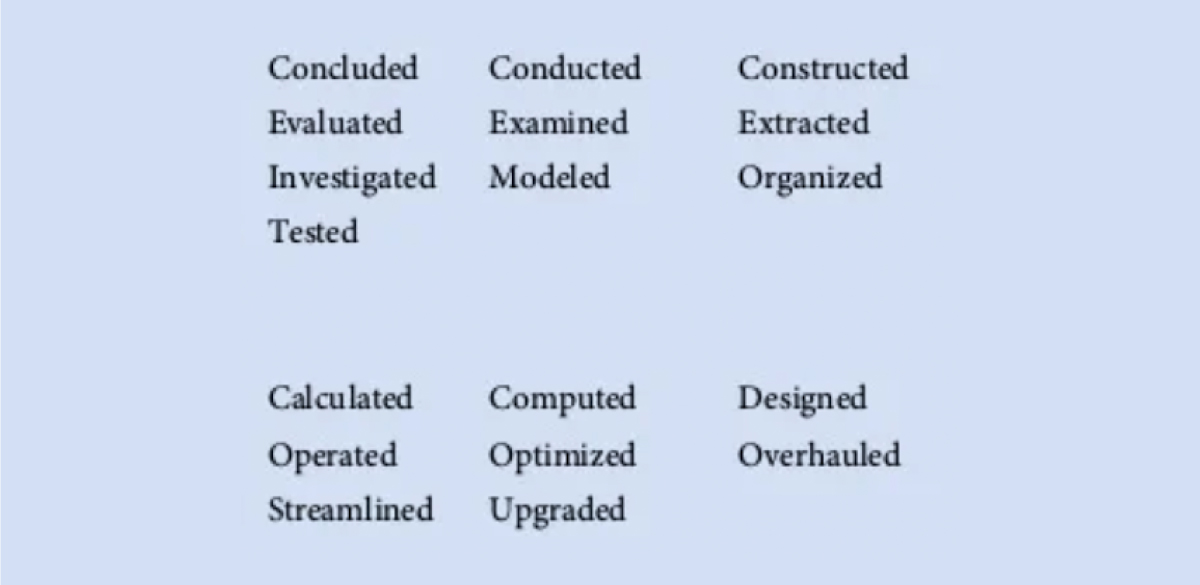
- Discard subjective phrases like “go-getter,” “challenging positions,” “opportunity for growth,” “growth-oriented,” etc. Also, any generic adjectives, such as passionate, innovative, expert, and so on, are redundant.
Customize Your Resume According to the Role
If you believe the same resume can be sent to two places, you haven’t researched the company enough. Customizing your resume goes beyond including the relevant keywords from the company’s job description.
Start with a “master resume” that includes everything you have ever done. Don’t leave out anything. Use that as a base for specific resumes you send out. Cherry-pick what is relevant to a particular company. Reframe them using the keywords at hand.
Look for other company requirements, such as the inclusion of references, portfolios, etc.
Skim through profiles of those in similar roles at the company and see what they mentioned in their LinkedIn job experience section.
In this process, you may find “hidden” essential skills that you have but are ignoring. The more you understand what the company values, the more you can identify applicable skills and strengths that you might not think are important enough.
Don’t Forget To Proofread
Use free grammar-checking tools to weed out spelling mistakes and other errors in language and punctuation. Keep an eye out for repeated phrases, buzzwords, or too many keywords stuffed in an unnatural way.
Other things to look out for:
- Incorrect or missing information (email, contact number)
- Outdated or irrelevant details
- Any significant gaps in the timeline which you might have to explain
- Abbreviations, either related to your industry or general ones like NY (New York), UCLA (University of California, Los Angeles), etc.
If you can, ask a mentor or friend in the industry (and one who isn’t) to look through your resume.
FAQs About Building a Sales Resume
We’ve got the answers to your most frequently asked questions.
What’s a Good Sales Resume Headline?
An impressive headline will nudge the recruiter to read further. You want your headline to be short, specific, and simple, preferably with a keyword and some quantifiable metric.
Don’t use cliches like “dedicated sales professional.” And you want your resume to be memorable, so tailor your resume headline to the company you are applying to.
Are Non-Sales Jobs Helpful in Building Your CV?
Only if you don’t have much sales experience. If this is the case, then focus on the transferable interpersonal skills that non-sales jobs have taught you, which can help you be a better candidate for the relevant sales job.
Make connections between the key skills and duties that the non-sales job entailed. If you cannot find any intersection between the non-sales job and the job you are applying for, you can skip it.
How Do I Prepare for a Sales Interview?
Other than preparing responses for standard sales interview questions, threat the interview like a sales meeting. This will show them how you approach sales.
Since you’re here…
Earn a tech-level salary, minus the whole learning-to-code part. Our Tech Sales Bootcamp will boost you into a tech sales job in just 3 months, or your tuition money back. Get a snapshot of our results on our student reviews page and read more about *your* new industry in this tech sales career guide.

![Technical Sales Representative Job Description [2022 Guide]](png/technical-sales-representative-job-description-2022-guide-380x235.png)

